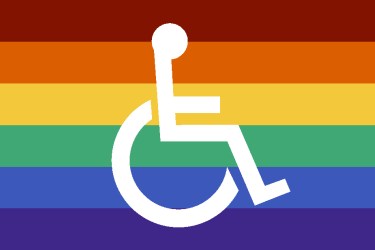As part of LGBTQ+ History Month 2022, a student’s perspective on intersectionality between disability and queer identity
The beginning of my secondary education was memorable to say the least; my health began declining exponentially, and I started to question whether this future
everyone was promising was even something I wanted. Imagining a life with a husband always seemed so overrated, like someone else’s dream, but surely everything would change once I met “the one” right? It would seem so, just not in the way I expected. Turns out falling for a girl would bring many more questions, and answers too. As my sexuality crisis came to full fruition, my health took a turn for the worse. I was diagnosed with a chronic illness and my mobility and energy were at an all-time low. Luckily, my close family and friends were very supportive, and I have come out (literally and figuratively) the other side comfortable with my sexuality and with help for my disability. However, a lot of people in this position are not so fortunate.
There remain many instances of homophobia and heteronormativity within the medical field, within sources of information, support, and representation.
Furthermore, despite there being definitive ties between those who identify as disabled and those who identify within the LGBTQ+ community, such as a shared
sense of un-belonging, of living in a society that does not value you as it should; the LGBTQ+ community is not always an accessible place if you are disabled. So many Pride events cater to the idea of flamboyant and energetic people, who can drink and dance and tolerate loud noises. But the truth is that this is not always the case, many people cannot physically access these events, for lack of chairs, or wheelchair inaccessibility, or fatigue, etc. I remember how painful it was to attend the Pride March in London a few years ago, how difficult it was to find somewhere I could rest away from the crowd. How I could never attend the parties or celebrations for the medication prevented me from drinking, and my neurodivergence meant loud noises and very social situations were extremely overwhelming.
Of course, this is not always the case, the LGBTQ+ community is incredibly welcoming to all sorts of people and there are some spaces out there. There is
certainly a great understanding between the disabled and queer communities, having experienced similar instances of “othering”, of the lack of privacy and random people telling you how you are supposed to live. However, there is still a definite issue with visibility and representation within the community and society as a whole, and a great need to create more disability inclusive spaces.
Written by Rowena Ward, student, 01.02.22
Support at Kent
Student Support and Wellbeing offer mental health support, disability support, counselling and peer support groups to all students. You could also check out our LGBTQ+ self-help resource section online. Student Support and Wellbeing are running a therapeutic ‘Reflect, Recover and Empower ‘ workshop explicitly for LGBTQ+ students on 21 February, 7-8.30pm with a particular focus on the personal impact of Covid-19 and coping with future change.
Check out further articles on Accessibility and Disability and Inclusion.

